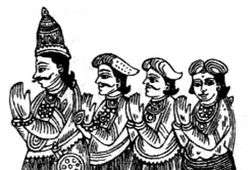Cankili I
Cankili I (Tamil: சங்கிலியன்) (died 1565), also known as Segarasasekaram, is the most remembered Jaffna kingdom king in the Sri Lankan Tamil history. He was very active in resisting Portuguese colonial inroads into Sri Lanka. He also inherited his throne via palace intrigues in which number of heirs apparent died under mysterious circumstances. At the end, he was removed from power by a local uprising that led to his son Puviraja Pandaram taking nominal power from him.
| Cekaracacekaran VII Cankili I | |||||
|---|---|---|---|---|---|
| King of the Jaffna Kingdom | |||||
 First from the right is Cankili I | |||||
| Reign | 1519–1561 | ||||
| Predecessor | Singai Pararasasegaram (Pararacacekaran VI) | ||||
| Successor | Puviraja Pandaram (Pararacacekaran VII) | ||||
| Born | Nallur | ||||
| Died | 1565 Nallur | ||||
| Burial | Nallur | ||||
| Issue | Puviraja Pandaram (Pararacacekaran VII) | ||||
| |||||
| Tamil | சங்கிலியன் | ||||
| House | Aryacakravarti dynasty | ||||
| Father | Singai Pararasasegaram (Pararacacekaran VI) | ||||
| Mother | Mangathammal | ||||
Biography
His father, Singai Pararasasegaram, had two principal wives and a number of concubines. His first wife, Rajalaksmi, had two sons, Singhabahu and Pandaram. Singai Pararasasegaram second wife was Valliammal, she bore him Paranirupasingham. Cankili's mother had Cankili and a daughter named Paravai. As part of palace intrigues, Cankili was able to ascend the throne.
Rule
According to a letter by Andre de Souza, ordered Cankili I on November 1544 the murder of his eldest son for converting to Catholicism.[1][2] The son was buried on the spot he was killed, where a chapel was built that later on served as the foundation for the construction of the present St. Mary's Cathedral at Jaffna.[3][4]
Cankili I resisted all contacts with the Portuguese and even massacred 600 – 700 Parava Catholics in the island of Mannar who were brought from India to Mannar by the Portuguese to take over the lucrative pearl fisheries from the Jaffna kings. He was removed from power due to a local uprising that led his son Puviraja Pandaram take nominal power. He wielded real power behind the throne until his death in 1565.[5][6]
Notes
- Gunasingam, Murugar (2005). Primary Sources for History of the Sri Lankan Tamils: A World-wide Search. M.V. Publications for the South Asian Studies Centre, Sydney. p. 86. ISBN 9780646454283.
- The Ceylon Antiquary and Literary Register. The Times. 1919. p. 60.
- Joseph, Dishan (2016-07-16). "Mannar Island of Martyrs » Nation". Nation. Retrieved 2018-04-24.
- Kurukshetra. Sri Lak-Indo Study Group. 1983. p. 68.
- Kunarasa, K The Jaffna Dynasty, p.82-84
- Gnanaprakasar, S A critical history of Jaffna, p.113-117
References
- Kunarasa, K (2003). The Jaffna Dynasty. Johor Bahru: Dynasty of Jaffna King’s Historical Society. p. 122. ISBN 955-8455-00-8.
- Gnanaprakasar, Swamy (2003). A Critical History of Jaffna (review of Yalpana Vaipava Malai). New Delhi: Asian Educational Services. p. 122. ISBN 81-206-1686-3.
| Preceded by Singai Pararasasegaram |
Jaffna Kingdom 1519–1561 |
Succeeded by Puviraja Pandaram |